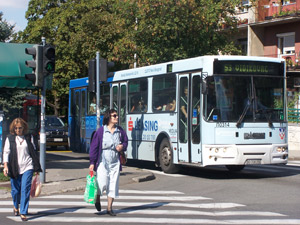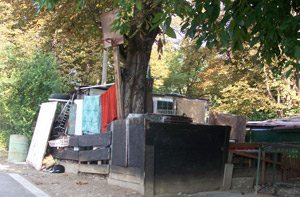Boy on the Bus: Crossing Paths with the Roma
October 2010
The Road Less Traveled
By Regina Landor
I am riding on the bus in Belgrade on a gray, cold afternoon when I see out of the window a small boy and his pregnant mother walking toward the bus. They are Gypsies, or Roma. I watch the little boy get on, but his mother seems to have disappeared. He’s holding a stocking hat, rocking slightly from foot to foot as he stands in front of each passenger, hoping for money. Surprisingly, people are putting in small bills. I turn around and realize why I hadn’t seen his mother: they split up and she sent him forward to appear as if he were alone. She is sitting in the very back of the bus. Our eyes meet. I quickly look away. She doesn’t need my judgment.

The child, who looks about four or five, is wearing gym shoes that are at least one size too big, baggy pants, and an oversized coat. He’s wearing a hat which partially conceals his dirty face, but only partially. When he passes my seat, I see it is smeared with dirt and snot.
Two mornings ago, in the comfortable living room of a spouse from the American Embassy, a coffee morning was held on the topic of the Roma in Serbia. We sat in overstuffed chairs, drinking coffee and eating doughnuts, coffee cake, rolls, muffins, and fruit, and we talked about their plight. Three speakers presented information about the lives of the Roma. There is no way of knowing how many of them live in Serbia. It could be two hundred thousand, or twice that many. Without identification cards or birth certificates, it’s not possible to know for certain how many there are.
Many Roma live in a vicious cycle, we learned: without these documents, it’s hard to get employed, or get an education; and without an education, without being able to read or speak in Serbian, it’s hard for many to even know how to get the proper documentation. In their community, it is considered the norm for children to marry at 12 or 14 years of age. Many children who do enter the school system do not have help with homework from parents or other elders who may only speak Romani and not understand Serbian. Even conveniences we completely take for granted are often missing in their homes, such as electric light by which to do their homework in the first place. Furthermore, education is not always a priority.
There are Civil Society Organizations in Serbia, some Roma-based, that work to convince families of the importance of education for their children. The immediate effect for the families is a drop in income: their kids are no longer on the street bringing home money. There’s not a huge incentive for the government to support this cause either. If their children are not out begging, the Roma are more dependent on state aid.
The question came up at the coffee morning: what can we do? One of the speakers discouraged giving money. She said that it may help them tonight and give them a meal now, but in the long run, giving them money encourages the lifestyle of begging, of sending the children out to beg. Whenever I drive in Belgrade, I see children at intersections, in the street, usually without shoes, approaching my car as I stop to wait for the light to change. I pray it changes quickly. I don’t know if I should give or not. When my own children are in the car, I am compelled to give. I feel like I am escorting little princes, my clean-faced children sitting high up in their booster seats in our minivan looking dispassionately down at the urchins below. I don’t want my children to learn not to give. Meanwhile, I have learned that some children are purposely sent out to beg without a coat, to evoke more sympathy. Apparently, the rate of abuse is also high: if children do not come home with money, they may get beaten.
So what should I do now? The little boy on the bus looks like he could use a good meal. I do have change in my pocket when he passes my seat, so I drop it into his hat.
On a further impulse, I go home and take out all of the clothes in my kids’ closet that no longer fit them. My American neighbors often leave stuff by the dumpsters for the Roma. The bins are rummaged through every day. Often, Roma will take something from a dumpster because it can be sold for recycling. I’ve seen people cart away things that appear completely worthless - scraps of metal, empty wine bottles, broken electronics - but I’m sure they have a purpose for them, or else why would they take them?

Occasionally, I talk to the guard at the bottom of my street. He is a kind man who encourages me with my Serbian and has a big, warm laugh. He feeds the pigeons every day, and he was doing that as I talked to him one afternoon, throwing the birds chunks of bread from the window of his booth. Out of the corner of my eye, I saw two Roma women approach the nearby dumpster, prepared to scavenge. I was startled when this man I was having a nice conversation with jumped up from his seat, leaned out his window, and aggressively shooed them away, as if they were a pack of wild dogs. Apparently, these women are a threat even to the neighborhood garbage.
To me, it feels demeaning to leave things for the Roma by the dumpster when their homes are literally right up the road from us. Historically, Roma were nomads. But today, from what I understand, the only reason for them to move is because they are evicted from their settlements. There is a very permanent-looking Roma camp on the hill above my son’s school. After dropping him off, I walk up the road with two bags of clothes: mostly sweaters, some warm pajamas, and pants.

A couple of guys are working on a car in front of the camp. Their homes are hovels made out of cardboard, metal, or anything that will hold fast. I’m impressed by the ingenuity of some of the structures, the little curtains hanging from makeshift windows, the buckets set out to catch rain water, the piles of wood in stacks that will be their only heat source in the winter, and possibly what they use to heat a meal. To survive like this in a changing climate, in the heat and the snow and the rain, they must be so resourceful. A vast array of jumbled objects lie about: broken bicycles, buckets, piles of wood, clotheslines with sheets and blankets out to dry, a lawn mower without a handle, lopsided tables, an assortment of chairs, and a few stray-looking dogs.
I don’t want to invade their privacy, but I approach the men who are working on their car. They immediately stand up, respectfully. We smile warmly at each other. “I have some clothes,” I say to them in Serbian. “Would you like them?” They are young men, and I am taken by their friendliness and polite manners. The taller one accepts the bag I hold out to him, and he slightly bows his head in thanks. He disappears into the maze of his living quarters with the bag, walking with purpose. Maybe I’ve just made a tiny difference in the comfort of a little boy. I say goodbye and turn to walk back to my home, my solid walls which will protect me in just about any weather.
© 2010 by Regina Landor. All rights reserved.
Regina Landor is married to a USAID Foreign Service Officer. They have two boys who are sometimes terrible but mostly wonderful.
2013 update: Regina has published a book! Forever Traveling Home addresses loss, fear, commitment, new life, and survival as a Foreign Service spouse and as a parent moving to Eastern Europe with kids. You can find her book here: Forever Traveling Home.



